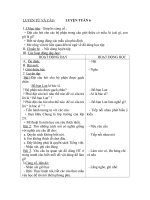LUYỆN từ VỰNG TIẾNG ANH 4 how to talk about tors (sessions 4–6)
Bạn đang xem bản rút gọn của tài liệu. Xem và tải ngay bản đầy đủ của tài liệu tại đây (237.56 KB, 42 trang )
4
HOW TO TALK ABOUT DOCTORS
(Sessions 4–6)
TEASER PREVIEW
What is the title of the doctor who specializes in:
internal medicine?
female ailments?
pregnancy and childbirth?
the treatment and care of infants and young children?
skin disorders?
diseases of the eye?
heart problems?
the brain and nervous system?
mental and emotional disturbances?
SESSION 4
In this chapter we discuss ten medical specialists—what they do,
how they do it, what they are called.
IDEAS
1. what’s wrong with you?
To nd out what ails you and why, this specialist gives you a
thorough physical examination, using an impressive array of tests: X
ray, blood chemistry, urinalysis, cardiogram, and so on.
An internist
2. female troubles?
This specialist treats the female reproductive and sexual organs.
A gynecologist
3. having a baby?
This specialist delivers babies and takes care of the mother during
and immediately after the period of her pregnancy.
An obstetrician
4. is your baby ill?
You know the common childhood maladies—mumps, whooping
cough, chicken pox, measles. This specialist limits his practice to
youngsters, taking care of babies directly after birth, supervising
their diet and watching over their growth and development, giving
them the series of inoculations that has done so much to decrease
infant mortality, and soothing their anxious parents.
A pediatrician
5. skin clear?
You have heard the classic riddle: “What is the best use for
pigskin?” Answer: “To keep the pig together.” Human skin has a
similar purpose: it is, if we get down to fundamentals, what keeps us
all in one piece. And our outer covering, like so many of our
internal organs, is subject to diseases and infections of various
kinds, running the gamut from simple acne and eczemas through
impetigo, psoriasis, and cancer. There is a specialist who treats all
such skin diseases.
A dermatologist
6. eyes okay?
The physician whose specialty is disorders of vision (myopia,
astigmatism, cataracts, glaucoma, etc.) may prescribe glasses,
administer drugs, or perform surgery.
An ophthalmologist
7. how are your bones?
This specialist deals with the skeletal structure of the body,
treating bone fractures, slipped discs, clubfoot, curvature of the
spine, dislocations of the hip, etc., and may correct a condition
either by surgery or by the use of braces or other appliances.
An orthopedist
8. does your heart go pitter-patter?
This specialist treats diseases of the heart and circulatory system.
A cardiologist
9. is your brain working?
This physician specializes in the treatment of disorders of the
brain, spinal cord, and the rest of the nervous system.
A neurologist
10. are you neurotic?
This specialist attempts to alleviate mental and emotional
disturbances by means of various techniques, occasionally drugs or
electroshock, more often private or group psychotherapy.
A psychiatrist
USING THE WORDS
Can you pronounce the words?
Words take on a new color if you hear them in your own voice;
they begin to belong to you more personally, more intimately, than
if you merely hear or read them. As always, therefore, say the words
aloud to take the rst, crucial step toward complete mastery.
1. internist
in-TURN′-ist
2. gynecologist
gīn (or jin or jīn)-Ə-KOL′-Ə-jist
3. obstetrician
ob-stƏ-TRISH′-Ən
4. pediatrician
pee′-dee-Ə-TRISH′-Ən
5. dermatologist
dur-mƏ-TOL′-Ə-jist
6. ophthalmologist
o -thal-MOL′-Ə-jist
7. orthopedist
awr-thƏ-PEE′-dist
8. cardiologist
kahr-dee-OL′-Ə-jist
9. neurologist
noor-OL′-Ə-jist
10. psychiatrist
sī (or sƏ)-KĪ′-Ə-trist
Can you work with the words?
Match each doctor to the eld.
FIELDS
1. mental or emotional
disturbances
DOCTORS
a. internist
2. nervous system
b. gynecologist
3. skin
c. obstetrician
4. diagnosis; internal organs
d. pediatrician
5. infants
e. dermatologist
6. female reproductive organs
f. ophthalmologist
7. eyes
g. orthopedist
8. heart
h. cardiologist
9. pregnancy, childbirth
i. neurologist
10. skeletal system
j. psychiatrist
KEY: 1–j, 2–i, 3–e, 4–a, 5–d, 6–b, 7–f, 8–h, 9–c, 10–g
Do you understand the words?
Is an internist an expert in diagnosis?
YES NO
Is a gynecologist familiar with the female reproductive organs?
YES NO
Does an obstetrician specialize in diseases of childhood?
YES NO
Does a pediatrician deliver babies?
YES NO
If you had a skin disease, would you visit a dermatologist?
YES NO
If you had trouble with your vision would you visit an orthopedist?
YES NO
Is an ophthalmologist an eye specialist?
YES NO
Does a cardiologist treat bone fractures?
YES NO
Is a neurologist a nerve specialist?
YES NO
If you were nervous, tense, overly anxious, constantly fearful for no
apparent reasons, would a psychiatrist be the specialist to see?
YES NO
KEY: 1–yes, 2–yes, 3–no, 4–no, 5–yes, 6–no, 7–yes, 8–no, 9–yes,
10–yes
Can you recall the words?
Write the name of the specialist you might visit or be referred to:
for a suspected brain disorder
1. N_________________
for a thorough internal checkup
2. I_________________
if you have a skin disease
3. D_________________
if you have a heart problem
4. C_________________
if you are tense, fearful, insecure
5. P_________________
if you are pregnant
6. O_________________
for some disorder of the female reproductive organs
7. G_________________
for a checkup for your two-month-old child
8. P_________________
for faulty vision
9. O_________________
for curvature of the spine
10. O_________________
KEY: 1–neurologist, 2–internist, 3–dermatologist, 4–cardiologist, 5–
psychiatrist, 6–obstetrician, 7–gynecologist, 8–pediatrician, 9–
ophthalmologist, 10–orthopedist
(End of session 4)
SESSION 5
ORIGINS AND RELATED WORDS
1. inside you
Internist and internal derive from the same Latin root, internus,
inside. The internist is a specialist in internal medicine, in the
exploration of your insides. This physician determines the state of
your internal organs in order to discover what’s happening within
your body to cause the troubles you’re complaining of.
Do not confuse the internist with the intern (also spelled interne),
who is a medical graduate serving an apprenticeship inside a
hospital.
2. doctors for women
The word gynecologist is built on Greek gyne, woman, plus logos,
science; etymologically, gynecology is the science (in actual use, the
medical science) of women. Adjective: gynecological (gīn [or jin or
jīn]-Ə-kƏ-LOJ′-Ə-kƏl).
Obstetrician derives from Latin obstetrix, midwife, which in turn
has its source in a Latin verb meaning to stand—midwives stand in
front of the woman in labor to aid in the delivery of the infant.
The su x -ician, as in obstetrician, physician, musician, magician,
electrician, etc., means expert.
Obstetrics (ob-STET′-riks) has only within the last 150 years
become a respectable specialty. No further back than 1834,
Professor William P. Dewees assumed the rst chair of obstetrics at
the University of Pennsylvania and had to brave considerable
medical contempt and ridicule as a result—the delivery of children
was then considered beneath the dignity of the medical profession.
Adjective: obstetric (ob-STET′-rik) or obstetrical (ob-STET′-rƏ-kƏl).
3. children
Pediatrician is a combination of Greek paidos, child; iatreia,
medical healing; and -ician, expert.
Pediatrics (pee-dee-AT′-riks), then, is by etymology the medical
healing of a child. Adjective: pediatric (pee-dee-AT′-rik).
(The ped- you see in words like pedestal, pedal, and pedestrian is
from the Latin pedis, foot, and despite the identical spelling in
English has no relationship to Greek paidos.)
Pedagogy (PED-Ə-gō′-jee), which combines paidos with agogos,
leading, is, etymologically, the leading of children. And to what do
you lead them? To learning, to development, to growth, to maturity.
From the moment of birth, infants are led by adults—they are
taught, rst by parents and then by teachers, to be self-su cient, to
t into the culture in which they are born. Hence, pedagogy, which
by derivation means the leading of a child, refers actually to the
principles and methods of teaching. College students majoring in
education take certain standard pedagogy courses—the history of
education; educational psychology; the psychology of adolescents;
principles of teaching; etc. Adjective: pedagogical (ped-Ə-GOJ′-Ə-kƏl).
A pedagogue (PED′-Ə-gog) is versed in pedagogy. But pedagogue has
an unhappy history. From its original, neutral meaning of teacher, it
has deteriorated to the point where it refers, today, to a narrowminded, strait-laced, old-fashioned, dogmatic teacher. It is a word of
contempt and should be used with caution.
Like pedagogue, demagogue (DEM′-Ə-gog) has also deteriorated in
meaning. By derivation a leader (agogos) of the people (demos), a
demagogue today is actually one who attempts, in essence, to mislead
the people, a politician who foments discontent among the masses,
rousing them to fever pitch by wild oratory, in an attempt to be
voted into o ce.
Once elected, demagogues use political power to further their own
personal ambitions or fortunes.
Many “leaders” of the past and present, in countries around the
world, have been accused of demagoguery (dem-Ə-GOG′-Ə-ree).
Adjective: demagogic (dem-Ə-GOJ′-ik).
4. skin-deep
The dermatologist, whose specialty is dermatology (dur-mƏ-TOL′-Əjee), is so named from Greek derma, skin. Adjective: dermatological
(dur′-mƏ-tƏ-LOJ′-Ə-kƏl).
See the syllables derma in any English word and you will know
there is some reference to skin—for example, a hypodermic (hī-pƏDUR′-mik) needle penetrates under (Greek, hypos) the skin; the
epidermis (ep-Ə-DUR′-mis) is the outermost layer of skin; a taxidermist
(TAKS′-Ə-dur-mist), whose business is taxidermy (TAKS′-Ə-dur-mee),
prepares, stu s, and mounts the skins of animals; a pachyderm (PAK′Ə-durm) is an animal with an unusually thick skin, like an elephant,
hippopotamus, or rhinoceros; and dermatitis (dur-mƏ-TĪ′-tis) is the
general name for any skin in ammation, irritation, or infection.
5. the eyes have it
Ophthalmologist—note the ph preceding th—is from Greek
ophthalmos, eye, plus logos, science or study. The specialty is
ophthalmology (o ′-thal-MOL′-Ə-jee), the adjective ophthalmological
(o ′-thal-mƏ-LOJ′-Ə-kƏl).
An earlier title for this physician, still occasionally used, is oculist
(OK′-yƏ-list), from Latin oculus, eye, a root on which the following
English words are also built:
1. ocular (OK′-yƏ-lƏr)—an adjective that refers to the eye
2. monocle (MON′-Ə-kƏl)—a lens for one (monos) eye, sported by
characters in old movies as a symbol of the British so-called upper
class
3. binoculars (bƏ-NOK′-yƏ-lƏrz)— eld glasses that increase the
range of two (bi-) eyes
4. And, strangely enough, inoculate (in-OK′-yƏ-layt′), a word
commonly misspelled with two n’s. When you are inoculated against
a disease, an “eye,” puncture, or hole is made in your skin, through
which serum is injected.
Do not confuse the ophthalmologist or oculist, a medical specialist,
with two other practitioners who deal with the eye—the optometrist
(op-TOM′-Ə-trist) and optician (op-TISH′-Ən).
Optometrists are not physicians, and do not perform surgery or
administer drugs; they measure vision, test for glaucoma, and
prescribe and t glasses.
Opticians ll an optometrist’s or ophthalmologist’s prescription,
grinding lenses according to speci cations; they do not examine
patients.
Optometrist combines Greek opsis, optikos, sight or vision, with
metron, measurement—the optometrist, by etymology, is one who
measures vision. The specialty is optometry (op-TOM′-Ə-tree).
Optician is built on opsis, optikos, plus -ician, expert. The specialty
is optics (OP′-tiks).
Adjectives: optometric (op-tƏ-MET′-rik) or optometrical (op-tƏMET′-rƏ-kƏl), optical (OP′-tƏ-kƏl).
REVIEW OF ETYMOLOGY
PREFIX, ROOT, SUFFIX
1. internus
MEANING
inside
EXAMPLE ___________
2. gyne
EXAMPLE ___________
woman
3. obstetrix
midwife
EXAMPLE ___________
4. paidos
child
EXAMPLE ___________
5. pedis
foot
EXAMPLE ___________
6. agogos
leading, leader
EXAMPLE ___________
7. demos
people
EXAMPLE ___________
8. derma
skin
EXAMPLE ___________
9. hypos
under
EXAMPLE ___________
10. ophthalmos
eye
EXAMPLE ___________
11. oculus
eye
EXAMPLE ___________
12. monos
one
EXAMPLE ___________
13. bi-
two
EXAMPLE ___________
14. -ician
expert
EXAMPLE ___________
15. opsis, optikos
vision, sight
EXAMPLE ___________
16. metron
measurement
EXAMPLE ___________
USING THE WORDS
Can you pronounce the words? (I)
1. intern (e)
2. gynecology
3. gynecological
IN′-turn
gīn-Ə-KOL′-Ə-jee, jin-Ə-KOL′-Ə-jee,
or jīn-Ə-KOL′-Ə-jee
gīn-Ə-kƏ-LOJ′-Ə-kƏl, jin-Ə-kƏ-LOJ′Ə-kƏl
or jīn-Ə-kƏ-LOJ-Ə-kƏl
4. obstetrics
ob-STET′-riks
5. obstetric
ob-STET′-rik
6. obstetrical
ob-STET′-rƏ-kƏl
7. pediatrics
pee-dee-AT′-riks
8. pediatric
pee-dee-AT′-rik
9. pedagogy
PED′-Ə-gō-jee
10. pedagogical
ped-Ə-GOJ′-Ə-kƏl
11. pedagogue
PED′-Ə-gog
12. demagogue
DEM′-Ə-gog
13. demagoguery
dem-Ə-GOG′-Ə-ree
14. demagogic
dem-Ə-GOJ′-ik
Can you pronounce the words? (II)
1. dermatology
dur-mƏ-TOL′-Ə-jee
2. dermatological
dur′-mƏ-tƏ-LOJ′-Ə-kƏl
3. hypodermic
hī-pƏ-DURM′-ik
4. epidermis
ep-Ə-DUR′-mis
5. taxidermist
TAKS′-Ə-dur-mist
6. taxidermy
TAKS′-Ə-dur-mee
7. pachyderm
PAK′-Ə-durm
8. dermatitis
dur-mƏ-TĪ′-tis
9. ophthalmology
o -thal-MOL′-Ə-jee
10. ophthalmological
o ′-thal-mƏ-LOJ′-Ə-kƏl
11. oculist
OK′-yƏ-list
12. ocular
OK′-yƏ-lƏr
13. monocle
MON′-Ə-kƏl
14. binoculars
bƏ-NOK′-yƏ-lƏrz
15. inoculate
in-OK′-yƏ-layt′
16. optometrist
op-TOM′-Ə-trist
17. optometry
op-TOM′-Ə-tree
18. optometric
op-tƏ-MET′-rik
19. optometrical
op-tƏ-MET′-rƏ-kƏl
20. optician
op-TISH′-Ən
21. optics
OP′-tiks
22. optical
OP-tƏ-kƏl
Can you work with the words? (I)
1. gynecology
a. principles of teaching
2. obstetrics
b. stu ng of skins of animals
3. pediatrics
4. pedagogy
5. demagoguery
6. dermatology
7. taxidermy
c. specialty dealing with the
delivery of newborn infants
d. stirring up discontent among
the masses
e. treatment of skin diseases
f. specialty dealing with women’s
diseases
g. specialty dealing with the
treatment of children
KEY: 1–f, 2–c, 3–g, 4–a, 5–d, 6–e, 7–b
Can you work with the words? (II)
1. hypodermic
a. elephant
2. epidermis
b. eye doctor
3. pachyderm
c. under the skin
4. dermatitis
d. one who measures vision
5. ophthalmologist
e. lens grinder
6. optometrist
f. outer layer of skin
7. optician
g. in ammation of the skin
KEY: 1–c, 2–f, 3–a, 4–g, 5–b, 6–d, 7–e
Do you understand the words?
Does a treatise on obstetrics deal with childbirth?
YES NO
Does gynecology deal with the female reproductive organs?
YES NO
Is pediatrics concerned with the diseases of old age?
YES NO
Does pedagogy refer to teaching?
YES NO
Is a pedagogue an expert teacher?
YES NO
Is a demagogue interested in the welfare of the people?
YES NO
Is a lion a pachyderm?
YES NO
Is the epidermis one of the layers of the skin?
YES NO
Is dermatitis an in ammation of one of the limbs?
YES NO
Is a taxidermist a medical practitioner?
YES NO
Is an ophthalmologist a medical doctor?
YES NO
Is an optometrist a medical doctor?
YES NO
Does an optician prescribe glasses?
YES NO
KEY: 1–yes, 2–yes, 3–no, 4–yes, 5–no, 6–no, 7–no, 8–yes, 9–no, 10–
no, 11–yes, 12–no, 13–no
Can you recall the words?
specialty of child delivery
1. O_________________
outer layer of skin
2. E_________________
principles of teaching
3. P_________________
thick-skinned animal
4. P_________________
skin in ammation
5. D_________________
one who foments political discontent
6. D_________________
one who sells optical equipment
7. O_________________
medical graduate serving his apprenticeship
8. I_________________
treatment of childhood diseases
9. P_________________
practice of stirring up political dissatisfaction for purely personal
gain
10. D_________________
one who stu s the skins of animals
11. T_________________
another title for ophthalmologist
12. O_________________
treatment of female ailments
13. G_________________
medical specialty relating to diseases of the eye
14. O_________________
one-lens eyeglass
15. M_________________
pertaining to the eye
16. O_________________
one who measures vision
17. O_________________
KEY: 1–obstetrics, 2–epidermis, 3–pedagogy, 4–pachyderm, 5–
dermatitis, 6–demagogue, 7–optician, 8–intern or interne, 9–
pediatrics, 10–demagoguery, 11–taxidermist, 12–oculist, 13–
gynecology, 14–ophthalmology, 15–monocle, 16–ocular, 17–
optometrist
(End of Session 5)
SESSION 6
ORIGINS AND RELATED WORDS
1. the straighteners
The orthopedist is so called from the Greek roots orthos, straight or
correct, and paidos, child. The orthopedist, by etymology, straightens
children. The term was coined in 1741 by the author of a textbook
on the prevention of childhood diseases—at that time the correction
of spinal curvature in children was a main concern of practitioners
of orthopedics (awr-thƏ-PEE′-diks).
Today the specialty treats deformities, injuries, and diseases of the
bones and joints (of adults as well as children, of course), often by
surgical procedures.
Adjective: orthopedic (awr-thƏ-PEE′-dik).
Orthodontia (awr-thƏ-DON′-shƏ), the straightening of teeth, is built
on orthos plus odontos, tooth. The orthodontist (awr-thƏ-DON′-tist)
specializes in improving your “bite,” retracting “buck teeth,” and by
means of braces and other techniques seeing to it that every molar,
incisor, bicuspid, etc. is exactly where it belongs in your mouth.
Adjective: orthodontic (awr-thƏ-DON′-tik).
2. the heart
Cardiologist combines Greek kardia, heart, and logos, science.
The specialty is cardiology (kahr-dee-OL′-Ə-jee), the adjective
cardiological (kahr′-dee-Ə-LOJ′-Ə-kƏl).
So a cardiac (KAHR′-dee-ak) condition refers to some
malfunctioning of the heart; a cardiogram (KAHR′-dee-Ə-gram′) is an
electrically produced record of the heartbeat. The instrument that
produces this record is called a cardiograph (KAHR′-dee-Ə-graf′).
3. the nervous system
Neurologist derives from Greek neuron, nerve, plus logos, science.
Specialty: neurology (n r-OL′-Ə-jee); adjective: neurological (n r-ƏLOJ′-Ə-kƏl).
Neuralgia (n r-AL′-ja) is acute pain along the nerves and their
branches; the word comes from neuron plus algos, pain.
Neuritis (n r-Ī-tis), is in ammation of the nerves.
Neurosis (n r-Ō′-sis), combining neuron with -osis, a su x
meaning abnormal or diseased condition, is not, despite its etymology,
a disorder of the nerves, but rather, as described by the late Eric
Berne, a psychiatrist, “… an illness characterized by excessive use
of energy for unproductive purposes so that personality
development is hindered or stopped. A man who spends most of his
time worrying about his health, counting his money, plotting
revenge, or washing his hands, can hope for little emotional
growth.”
Neurotic (n r-OT′-ik) is both the adjective form and the term for a
person su ering from neurosis.
4. the mind
A neurosis is not a form of mental unbalance. A full-blown mental
disorder is called a psychosis (sī-KŌ′-sis), a word built on Greek
psyche, spirit, soul, or mind, plus -osis.
A true psychotic (sī-KOT′-ik) has lost contact with reality—at least
with reality as most of us perceive it, though no doubt psychotic
(note that this word, like neurotic, is both a noun and an adjective)
people have their own form of reality.
Built on psyche plus iatreia, medical healing, a psychiatrist by
etymology is a mind-healer. The specialty is psychiatry (sī- or sƏ-KĪ-









